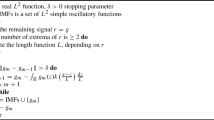Abstract
We present a new fast algorithm for Recursive Least-Squares(rls) adaptive filtering that uses displacement structure and subsampled updating. Thefsu ftf algorithm is based on the Fast Transversal Filter(ftf) algorithm, which exploits the shift invariance that is present in therls adaptation of afir filter. Theftf algorithm is in essence the application of a rotation matrix to a set of filters and in that respect resembles the Levinson algorithm. In the subsampled updating approach, we accumulate the rotation matrices over some time interval before applying them to the filters. It turns out that the successive rotation matrices themselves can be obtained from a Schur type algorithm which, once properly initialized, does not require inner products. The various convolutions that thus appear in the algorithm are done using the Fast Fourier Transform(fft). For relatively long filters, the computational complexity of the new algorithm is smaller than the one of the well-known lms algorithm, rendering it especially suitable for applications such as acoustic echo cancellation.
Résumé
Dans cet article, un nouvel algorithme rapide des moindres carrés récursif (mcr) est présenté, basé sur une structure de déplacement et une mise à jour souséchantillonnée. Le fsu ftf est dérivé à partir de l’algorithme ftf qui exploite l’invariance par décalage inhérente au filtrage adaptatif par les mcr. L’algorithme ftf peut être vu comme l’application d’une matrice de rotation à un ensemble de filtres et s’apparente de ce point de vue à l’algorithme de Levinson. Dans une approche de mise à jour du filtre adaptatif sous-échan-tillonnée, on accumule pendant un bloc d’échantillons les matrices de rotation successives puis, on applique la matrice du résultat aux filtres. Ces matrices de rotation peuvent être obtenues en utilisant une procédure de type Schur. On évite ainsi les calculs de produits scalaires, sauf pour l’initialisation de cet algorithme FTF-Schur. Les convolutions qui apparaissent ainsi à différents endroits dans l’algorithme sont effectuées à l’aide de la transformée de Fourier rapide (tfr). Pour des filtres relativement longs, la complexité du nouvel algorithme est plus faible que celle du lms, ce qui le rend très adapté pour la résolution de problèmes tels que celui de l’annulation d’écho acoustique.
Similar content being viewed by others
References
Cioffi (J. M.), Kailath (T.). Fast, recursive least squares transversal filters for adaptive filtering.IEEE Trans. ASSP (April 1984),32, n° 2, pp. 304–337.
Haykin (S.). Adaptive filter theory.Prentice-Hall, Englewood Cliffs, NJ, second edition (1991).
Kailath (T.). Linear systems.Prentice-Hall, Englewood Cliffs, NJ (1980).
Oppenheim (A. V.), SchAfer (R. W.). Digital signal processing.Prentice-Hall, Englewood Cliffs, NJ (1975).
Ren (Z.), Hartmann (I.), Schütze (H.). Computationally efficient fast recursive least squares algorithms. In André Gilloire, editor,Proc. Third International Workshop on Acoustic Echo Control, Plestin-les-Grèves, France (Sep. 7-8, 1993), pp. 67–74.
Slock (D. T. M.). Reconciling fast rls lattice and qr algorithms. InProc. ICASSP 90 Conf., Albuquerque, NM (April 3-6, 1990), pp. 1591–1594.
Slock (D. T. M.). Backward consistency concept and round-off error propagation dynamics in recursive least-squares algorithms.Optical Engineering (June 1992),31, n° 6, pp. 1153–1169.
Slock (D. T. M.), Kailath (T.). Numerically stable fast transversal filters for recursive least-squares adaptive filtering.IEEE Trans. ASSP (Jan. 1991),39, n° 1, pp. 92–114.
Slock (D. T. M.), Maouche (K.). The fast subsampled-updating recursive least-squares (fsu rls) and fast transversal filter (fsu ftf) algorithms for adapting long fir filters. In André Gilloire, editor,Proc. Third International Workshop on Acoustic Echo Control, Plestin-les-Grèves, France (Sep. 7–8, 1993), pp. 75–86.
Slock (D. T. M.), Maouche (K.). Un algorithme des moindres carrés récursif rapide: le fsu rls. InProc. Quatorzième Colloque sur le Traitement du Signal et des Images, Juan-les-Pins, France (Sep. 13-16, 1993), pp. 495–498.
Slock (D. T. M.), Maouche (K.). The fast subsampled-updating recursive least-squares (fsu rls) algorithm for adaptive filtering based on displacement structure and the fft.Signal Processing (1994),40, n° 2.
Slock (D. T. M.), Maouche (K.). The fast transversal filter (fsu ftf) rls algorithm for adapting long fir filters.In Proc. VII European signal, Proc. Conference, Edinburgh, UK (Sep. 13–16, 1994).
Author information
Authors and Affiliations
Additional information
This work was supported in part by the cnet, France, under contract n° 93 6 B 005. This work has also benefitted from cooperations within the group of signal processing researchers Gdr 134 TdSI (part of the French cnrs).
Rights and permissions
About this article
Cite this article
Slock, D.T.M., Maouche, K. The fast subsampled-updating fast transversal filter (FSU FTF) RLS algorithm. Ann. Télécommun. 49, 407–413 (1994). https://doi.org/10.1007/BF02999429
Received:
Issue Date:
DOI: https://doi.org/10.1007/BF02999429
Key words
- Fast algorithm
- Adaptive filtering
- fir filter
- Transverse filter
- Least squares method
- Updating
- Recursivity
- Algorithm complexity




